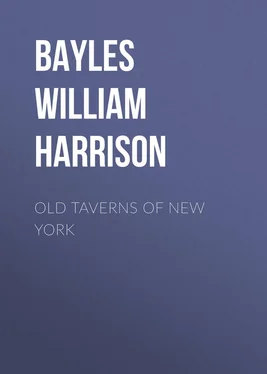William Bayles - Old Taverns of New York
Здесь есть возможность читать онлайн «William Bayles - Old Taverns of New York» — ознакомительный отрывок электронной книги совершенно бесплатно, а после прочтения отрывка купить полную версию. В некоторых случаях можно слушать аудио, скачать через торрент в формате fb2 и присутствует краткое содержание. Жанр: foreign_antique, foreign_prose, на английском языке. Описание произведения, (предисловие) а так же отзывы посетителей доступны на портале библиотеки ЛибКат.
- Название:Old Taverns of New York
- Автор:
- Жанр:
- Год:неизвестен
- ISBN:нет данных
- Рейтинг книги:3 / 5. Голосов: 1
-
Избранное:Добавить в избранное
- Отзывы:
-
Ваша оценка:
- 60
- 1
- 2
- 3
- 4
- 5
Old Taverns of New York: краткое содержание, описание и аннотация
Предлагаем к чтению аннотацию, описание, краткое содержание или предисловие (зависит от того, что написал сам автор книги «Old Taverns of New York»). Если вы не нашли необходимую информацию о книге — напишите в комментариях, мы постараемся отыскать её.
Old Taverns of New York — читать онлайн ознакомительный отрывок
Ниже представлен текст книги, разбитый по страницам. Система сохранения места последней прочитанной страницы, позволяет с удобством читать онлайн бесплатно книгу «Old Taverns of New York», без необходимости каждый раз заново искать на чём Вы остановились. Поставьте закладку, и сможете в любой момент перейти на страницу, на которой закончили чтение.
Интервал:
Закладка:
The Dutch of New Amsterdam had a large capacity for enjoyment and in their holiday season of Christmas and New Year, gave themselves up to every kind of festivity and sport that the place could afford. We find from records that some of these were firing of guns, beating of drums, dancing, playing of tick-tack, bowling, playing of ninepins, sleighing parties or wagon rides, etc. The taverns and taprooms were full of life and there were likewise many family festivities and amusements, where the tables were loaded with all the good things to eat and drink that were obtainable. Not only was it the season of the delight and enjoyment of the young and gay, but the older and graver citizens joined in the sports with enthusiasm and encouragement. Even the Burgomasters and Schepens, with the other officials, when the season of festivity approached, closed the public offices temporarily. “Whereas,” it is recorded, “the winter festivals are at hand, it is found good, that between this date and three weeks after Christmas the ordinary meetings of the Court shall be dispensed with.”
Gathered together to celebrate one of the anniversaries of the festive season, the flickering lights from oil lamps and tallow candles, reflected from the whitewashed walls of Madame Wessels’ assembly room, shone on as happy and gay hearted a gathering as is found in the magnificent and brilliantly lighted halls of our present grand city. They shone on “fair women and brave men.” Notwithstanding the humorous caricatures of Washington Irving, the women were comely and the men were a sturdy and adventurous lot. Here was the government official, with his sword at his side. Here was the prosperous trader or merchant in his silk or velvet breeches and coat flowered with silver lace, with gold or silver buttons, lace neck cloth and silk stockings. He also wore a sword. The common burgher in his homespun breeches and Kersey coat also took a part. Handsome dresses, displayed on female forms were not numerous but there were some that indicated the success and prosperity of the heads of the families represented by the wearers. Gowns of thick embroidered silk and petticoats of cloth and quilted silk graced the festive dance.
May-day was also celebrated with great spirit and on this occasion the people were accorded by the city magistrates the greatest license. It was announced that “any damage which may come from the general rejoicing within the city on May-day shall be made known to the Burgomasters at the City Hall immediately thereafter when means shall be taken to furnish reparation.”
But Governor Stuyvesant had no sympathy for such “unprofitable customs,” and such “unnecessary waste of powder.” He forbade on New Year and May-days, the firing of guns, the beating of drums or the planting of May-poles, and ordered that at these times there shall not be “any wines, brandy-wines or beer dealt out.” It is supposed that this ordinance was not strictly enforced and that its restrictions were little observed.
Stuyvesant also, in February, 1658, forbade the farmers and their servants to “ride the goose” at the feast of Bacchus and Shrovetide, which brought a protest from the Burgomasters and Schepens, who felt aggrieved that the Director General and Council should have done so without their knowledge and consent. “Riding the goose,” or “pulling the goose,” was a cruel sport, but it was not the fate of the goose that moved the tender heart of Stuyvesant. He says in response to the protest that “in their time it has never been practiced here, and yet, notwithstanding the same may in some place of the fatherland be tolerated and looked at through the fingers , it is altogether unprofitable, unnecessary and criminal for subjects and neighbors to celebrate such pagan and Popish feasts, and to practice such evil customs.” He then gives the Burgomasters and Schepens a sound scolding for their presumption, and informs them “that the institution of a little bench of Justice under the title of Schout, Burgomasters and Commissioners does in no wise interfere with or diminish aught of the power and authority of the Director General and Councellors in the enacting of any ordinance or making any particular interdict, especially such as tend to the glory of God and the best interests of the Inhabitants.”
II
New York and the Pirates
When the English captured New Amsterdam, the heart of the British soldier was no doubt cheered and gladdened by the sight of the Sign of Saint George and the Dragon, which was boldly hung out in front of the house looking out on the river on the west side of the present Pearl Street just above Maiden Lane, kept by James Webb, from London. It was a stone house which had been built more than fifteen years before by Sander Leendertsen (Alexander Lindsay), upon the site of the present 211 Pearl Street. When in March, 1665, the citizens were called upon to state how many soldiers they could lodge, the entry is made in the records that “The Man of the Knight of St. George will take one,” which undoubtedly refers to the landlord of this house. Webb, in 1665, married Margaret Radel, a widow, and probably kept the house for some years. It was on the road leading to the Long Island ferry, a favorite location for taverns.
Although Colonel Nicolls, the first deputy Governor for his Royal Highness, James, Duke of York, is said to have filled his purse from the proceeds of land grants and by compelling the holders of old grants to pay him for confirmation, and to have been active in adding to his profits in many other ways, and, although he was given despotic power, yet his rule was characterized by so much leniency and moderation, compared with the paternal, though arbitrary, rule of Peter Stuyvesant, that he became as popular with the inhabitants as, under the circumstances, could be expected. When, at the end of four years, he solicited and obtained his recall, a grand dinner was given him at the house of Cornelis Steenwyck, one of the most prominent Dutch merchants of the city, and two militia companies, the Dutch officers of which had received their commissions from him, escorted him to the ship which was to bear him to England.
The English officials were naturally desirous of introducing English ways and customs. Moved by this spirit, Governor Nicolls, to encourage the English sport of horse-racing, established a race-course at Hempstead, Long Island, which was continued and kept up by his successors, who issued proclamations, directed to the justices, that races should be held in the month of May.
New York, when it came into the hands of the English, was thoroughly Dutch, and the Englishman was not pleased by the ways and customs of the Dutch in tavern life, so different from the English. In a tavern conducted in the Dutch way, where the landlord and all the attendants spoke the Dutch language, the government officials and the English officers did not feel that ease and comfort that they would in a truly English inn.
The prominent Dutch taverns continued to flourish, but in the course of time, there was a gradual change, produced by the English influence. The Dutch tavern keeper differed much from the inn-keeper of England, and the newcomers, assuming the airs of conquerors, accustomed to the warm welcome of an English inn, chafed under the restrains which they found or fancied, and many broils occurred between the landlords and their Dutch countrymen on one side and the English soldiers and sailors on the other.
Although previous to this time and some years subsequent, the records of public business transacted at taverns are numerous, for a long time after the English came into control, there is no indication that the taverns were thus much used by the English officials. The want of a tavern truly English, that would satisfy the officers of the government, may have been the cause which led Governor Lovelace to build, in 1672, on his own account, an inn or ordinary right next to the City Hall, and to ask the magistrates for permission to connect the upper story of the house with the City Hall by a door opening into the Court’s Chambers. The proposition was agreed to by the magistrates, leaving it to the governor to pay what he thought fit for “the vacant strooke of ground” lying between the buildings and “not to cut off the entrance into the prison doore or common gaol.”
Читать дальшеИнтервал:
Закладка:
Похожие книги на «Old Taverns of New York»
Представляем Вашему вниманию похожие книги на «Old Taverns of New York» списком для выбора. Мы отобрали схожую по названию и смыслу литературу в надежде предоставить читателям больше вариантов отыскать новые, интересные, ещё непрочитанные произведения.
Обсуждение, отзывы о книге «Old Taverns of New York» и просто собственные мнения читателей. Оставьте ваши комментарии, напишите, что Вы думаете о произведении, его смысле или главных героях. Укажите что конкретно понравилось, а что нет, и почему Вы так считаете.












